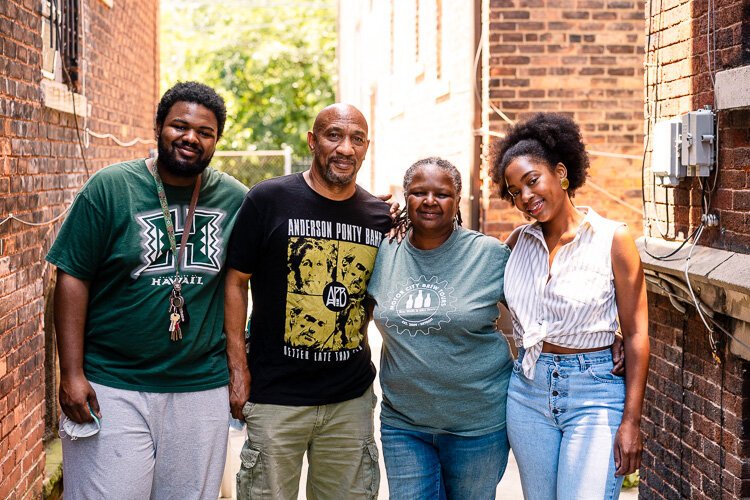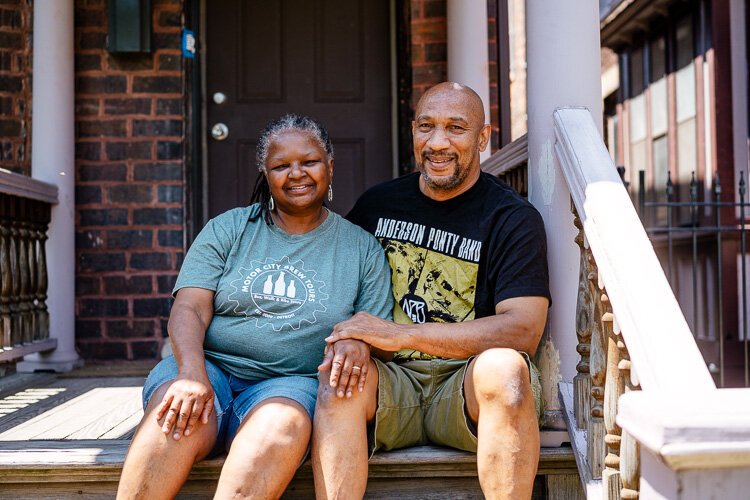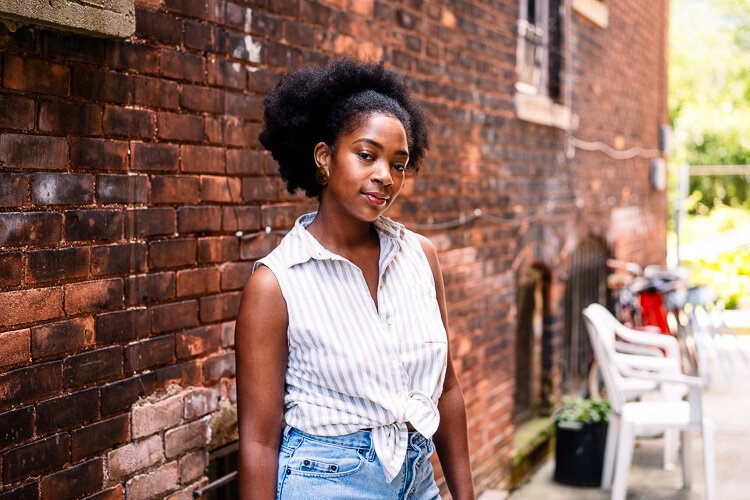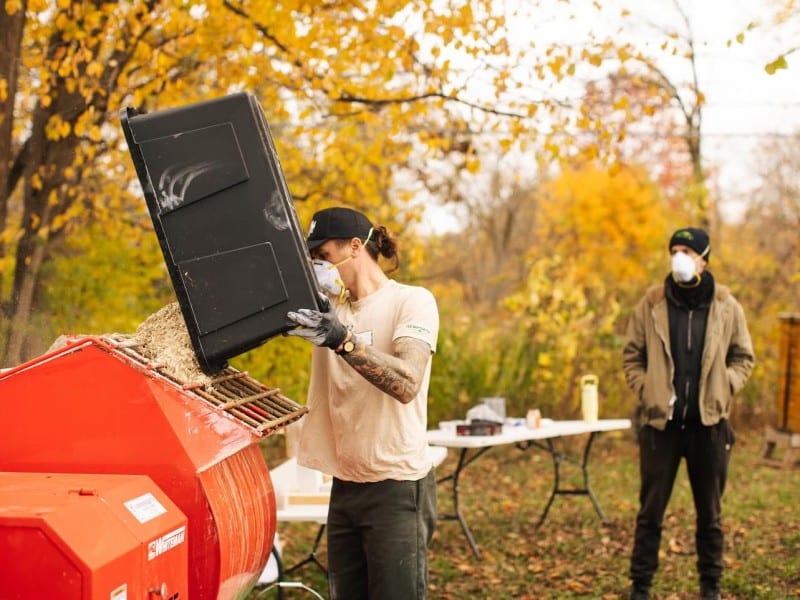From the frontlines to entrepreneurship, Woodbridge family navigates pandemic’s challenges
Over the last three decades in Woodbridge, Otto and Cheryl Cureton have raised children, established successful careers in health care, and invested in neighborhood development. Now, amid the COVID-19 pandemic, their family has found a way to adjust to a new lifestyle.
When Otto and Cheryl Cureton moved into the home on Commonwealth they’d spent six years restoring in 1993 after a fire destroyed their house in Detroit’s North End half a decade earlier, the couple had no way of knowing they would spend the next 27 years in Woodbridge, investing in the neighborhood while the city — and world — changed around them. “We bought a house that needed a lot of work,” Otto says. “And we put in the work, and moved in.”
Introduced by a mutual friend in East Lansing in 1981, the couple (both Detroit natives) returned to their home city later that year to pursue careers in health care. Cheryl, who graduated from Michigan State University’s nursing program two years earlier, took a job at Harper University Hospital (the unit where she cared for pre- and post-operation cancer patients later became part of Karmanos). At the same time, Otto began working toward a degree in respiratory therapy at Highland Park Community College. After completing the program in 1984, he accepted a position as a respiratory therapist at Detroit Receiving Hospital.
Over the next three decades, as the Curetons continued their careers, they dedicated their free time to developing the neighborhood they called home. The couple purchased and restored an old apartment building and a rundown four-family rental next door to their Woodbridge home, and in 2018, Otto joined the Woodbridge Neighborhood Development Corp. board of directors, which he remains part of today. (Editor’s note: Woodbridge Neighborhood Development is the funder of this series.) Over the years, the Curetons also raised three children — Cye, 32, Charles, 28, and Salika, 40 (Otto’s daughter from a previous relationship) — and eventually watched them move out on their own.
“We were empty nesters — enjoying life, eating out at all the different new restaurants,” Cheryl says. But earlier this year, when Gov. Gretchen Whitmer issued a statewide shelter-in-place order in March in response to the threat of COVID-19, suddenly, the Curetons found themselves staying in as much as possible and adjusting to a new lifestyle.
At Detroit Receiving, Otto says things were busy. “Almost a week into the pandemic, I ended up injuring my hip. After that, I was down for about a week and a half,” Otto recalls. “And then I went back and picked up right where I left off. It was really busy at work — a lot of COVID patients coming in.”
Like many health care workers on the frontlines, the Curetons took precautions to avoid transferring the virus from the hospital to their home. “I think [Otto’s] biggest concern was that he would bring [the virus] back,” Cheryl says, adding that Otto would often change out of his scrubs before entering the house and shower as soon as he came in the door from his shifts at the hospital to avoid exposing her to COVID-19.
As a result of those experiences, Otto also became a strong advocate for masks. “Wearing your mask is looking out for other folks,” Otto says, adding that he believes masks can also help protect Black people, who are disproportionately affected by COVID-19.
At Karmanos, Cheryl’s experience as a surgical nurse in a cancer ward was different. Before the pandemic, she says, “it was a regular work schedule.” But once the shelter-in-place orders took effect, Cheryl says a lot of surgeries were canceled and many of the nurses in her unit lost work. After using up all of her vacation time, Cheryl decided to take an early retirement at the suggestion of one of her managers. “We could have almost no patients up there, so often we’d get pulled [from our shift],” she says. “I was planning on retiring this year — later in the year. But because we weren’t getting any hours, and also because of my health issues, I decided to retire in late April.”
With unexpected free time on her hands, Cheryl says she hunkered down at home and focused on her other passions. “One of my hobbies is sewing, so I’ve been doing more sewing — mask-making, things of that nature,” she says, adding that she also spent a lot of time helping her daughter, Cye, who lives next door, prepare to reopen her business in anticipation of the shelter-in-place orders being lifted.
While her parents dealt with the pandemic on the frontlines, as a hair stylist, multidisciplinary artist and musician, and youth educator, Cye Cureton says her life changed dramatically as a result of the pandemic. “When the whole state shut down, my entire life shut down,” she says. Forced to temporarily halt the natural hair protective styling services she offers under the name Hair Hut Detroit, Cye says she also lost work as a performer when venues and conferences she’d booked responded to the pandemic with closures and cancellations. Although she says one of her tentative standing gigs with a local venue has plans to go virtual, the transition from live performance to digital presented its own unique set of challenges as she struggled to acquire the video and editing equipment necessary to participate.
In addition to her entrepreneurial ventures, Cye is also the art director at SAY Play Center Detroit, where she builds education plans and curriculums for youth on the city’s east side. Because the center works closely with children, she says she was laid off from her job due to concerns about spreading the virus. “Nobody wanted to take that risk,” Cye says. “So our center complied with the school guidelines when it came to opening and closing.”
Adding to the financial challenges of closing her business and being laid off from the youth center, Cye says she still has not received her IRS stimulus check and has also been unable to sort through obstacles with the unemployment application process. “My pride won’t let me ask my parents for money,” she says. “But I will say, I have — a few times — shopped in their pantry closet.”
Although the youth center has begun to explore options for reopening in the fall, and Cye has started to book hair clients again after a second executive order was issued by Whitmer last month, Cye says the combination of financial stress, isolation, and fear of the virus took a harsh toll on her mental health. “It was heavy,” she says. “It still is. I’m still affected by it because I can’t be social at all. I can’t be close to my friends, so I still feel isolated to a certain extent.”
It’s not the first time she’s experienced feelings of isolation. Growing up in Woodbridge, there were times she felt being one of the only Black residents in her part of the neighborhood felt “loud.” But amid the pandemic, she says she’s noticed more people in the neighborhood coming. “My wish and hope for Woodbridge is that we can unite and be against racism together,” she says.
Although the psychological impact of the pandemic has been difficult, Cye’s mood has begun to lift a little as restaurants and other businesses have started to reopen. After attending a recent outdoor, physically-distanced dance party outside Woodbridge Pub, a popular neighborhood gathering place, Cye says the experience left her refreshed. “I felt like myself again,” she says. “I could dance like no one was watching. I felt free for the first time in a really long time.”
This story is part of an ongoing series done in partnership with Woodbridge Neighborhood Development to highlight stories of resilience in the neighborhood.








